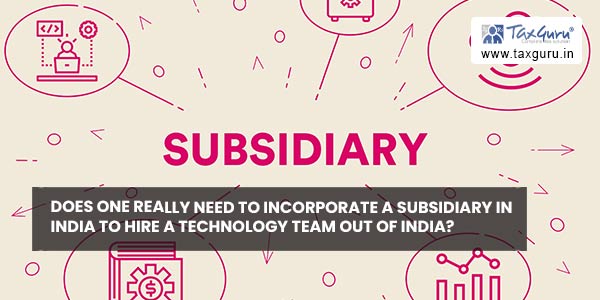India is very well known for its technology talent. Be it the likes of Sunder Pichai (CEO of Google), Satya Nadella (CEO of Microsoft), Parag Agarwal (CEO of Twitter) or the millions of technology graduates who support Indian and global businesses with their IT acumen. The Indian tech talent is not only limited to Core IT services but is now also very well equipped to handle AI, IoT, big data analytics and cloud computing. As per estimates by NASSCOM in early 2022, India’s tech talent demand-supply gap is the lowest in the world and the increasing pool of graduates coupled with a maturing talent ecosystem is helping the growth of the digital talent pool in the country.
Many global companies have set up their wholly owned subsidiaries or branch offices in India.
The same entails setting up an entity in India, hiring a finance/ legal team, and leasing out office space apart from the core function of hiring technology graduates in the country. The same is cost-effective over larger teams and longer time investment.
In recent times, many global Small & Medium Enterprises (SMEs) have also started looking for support from India-based teams. For these companies, setting up an entity in India might be an expensive proposition. There are a few options that companies can take to hire a team in India. The same have been discussed below:
Following are some options (along with some Pros & Cons) that are generally explored:
I) Set-up Subsidiary in India
Pros:
- The team works out of one place
- Management control.
- The global entity & Indian entity are separate structures.
- Future expansion can be undertaken
- The Indian market offers demand
Cons:
- Hire team for finance/ legal and other non-core functions.
- Costs are higher and may not be suitable for smaller teams.
- Transfer pricing regulations, Compliance costs, litigation, and office space costs may be deterrents.
II) Work with An Outsourcing Company
Pros:
- No need to let-out office space
- No compliance/ regulatory costs
- Assistance with all Non-Core functions
Cons:
- Higher costs and non-transparent costing leading to employee dis-satisfaction & turnover
- Long term teams do not get built/ no permanent connect with parent entity
III) Directly work with a Consultant
Pros:
- Direct connect with global teams
- Costs are transparent
- Team structures can be created
Cons:
- Consultants do not get employment benefits
- Cross-border taxation (Permanent Establishment risks for the global entity).
- Indian consultant(s) are required to undertake more compliances.
Over the last couple of years, we have seen global companies choosing the option of the Virtual Entity services in India. The employees and teams are managed very transparently by the Indian consultants. The consultants regularly assist the global entities by managing their teams through the Employer on Record service.
IV) Virtual Indian Entity
Pros:
- Indian teams are directly connected with the global team(s).
- Costs are transparent as a % of employee cost.
- Employees can be hired by any vendor or global entity itself.
- Team structures and longevity can be built into the system.
- No compliances are to be undertaken by global companies.
- No Permanent Establishment Risk for the global entity.
- Indian consultants are not required to undertake additional compliance that the global entity might be subject to.
- The need for ancillary teams for finance/ legal functions does not arise as these are undertaken by the consultant.
- Seamless team transfer is possible for when the Indian entity gets set up in future.

Cons:
The employees are hired by the EOR so tend to want more comfort and association with the global entity.
Following are some case studies of utilization of “Virtual Entity” in India
a) Global technology company ‘A’ wanted to hire a team of 10 software developers in India. They were already working with some consultants who were exposing the company to Permanent Establishment (PE) risk. They chose a Virtual Entity service in India and were able to expand their team without establishing a PE in India.
b) Company ‘S’ exports their products to 15 countries including India. Indian customers wanted them to hire technicians in India who are trained on their products and able to provide regular service. Company ‘S’ set up a virtual entity in India and was able to provide service in India quickly as no time was spent in compliances and other setup formalities.
c) Company ‘N’ has a chemical business in Taiwan. They want to set up an Indian entity but first needed to understand the working in India for which they want to send across two team members who can work in India and collect industry knowledge. They could use the services of a Virtual entity and then over a couple of years set up their entity in India. This ensured timely industry information. This in turn helped formulate a better strategy for set up in India without the fear of having to wind up the initial entity.
d) Company ‘R’ in Singapore is looking at outsourcing certain financial processes in India. They have worked with outsourcing companies but the quotes are not transparent and over time there is high employee turnover as the benefits are not passed on to the actual people who are working. Company R does not wish to set up an entity in India due to the compliance costs and aversion to any litigation/ liabilities in India. Company R can use a Virtual entity in India to solve all these problems.
About the Author
Paramnoor Singh is a dual qualified professional. He has been assisting global companies set up in India over the last 15 years. He is an expert in matters of International Taxation.
If you need any information on the Virtual entity services or have any queries on how this works, please feel free to write to him directly at paramnoor.singh@r-arora.com.





